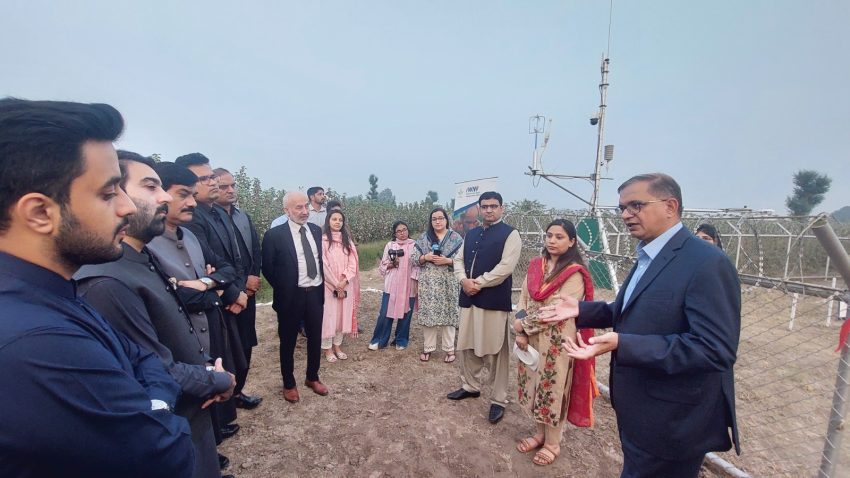RAHIM YAR KAHN—The International Water Management Institute (IWMI) has significantly addressed Pakistan’s water crisis by installing the country’s first Eddy Covariance (EC) Flux Towers in Khwaja Fareed University of Engineering & Information Technology (KFUEIT) in Punjab’s Rahim Yar Khan district.
IWMI, a water research organisation, has also been deployed in four key districts of Punjab: Okara, Rahim Yar Khan, Chakwal, and Faisalabad. They are designed to collect accurate data on water usage, carbon emissions, and energy fluxes from irrigated agricultural landscapes. This initiative is part of the FCDO’s Water Resource Accountability in Pakistan (WRAP) and CGIAR’s Nexus Gains Projects.
During the inauguration of the Flux Tower, part of the CGIAR Nexus Gains initiative, Vice Chancellor Prof Dr Amir Azam Khan highlighted the crucial role of technology in tackling water scarcity issues in Punjab. He stated, “This pioneering technology marks a significant advancement in smart water management. It offers actionable insights to enhance water use efficiency, minimize environmental impact, and strengthen resilience against climate-related challenges.”
Dr Mohsin Hafeez, Director of Water, Food, and ecosystems at the International Water Management Institute (IWMI), emphasized the project’s broader implications, stating, “The EC Flux Towers are more than just instruments; they are enablers of informed decision-making for sustainable agriculture and water security in Pakistan. The data generated will be instrumental in shaping policies to address water scarcity and climate adaptation.”
The EC Flux Towers are equipped with advanced sensors, including CO2/H2O analyzers and net radiometers, which continuously measure evapotranspiration, energy consumption, and crop carbon emissions within a 200-500 meter radius. This real-time, high-resolution data will assist policymakers, researchers, and farmers in optimizing water usage, reducing greenhouse gas emissions, and enhancing the sustainability of agricultural practices. Furthermore, this data will validate remote sensing models, allowing for more accurate large-scale estimates of water and energy fluxes.
These systems have been installed as Punjab’s agricultural sector faces challenges due to increasing water demand, inefficient resource management, and the compounding effects of climate change.
Dr Mohsin further noted that the insights provided by the EC Flux Towers would facilitate improved water budgeting and resource allocation, supporting efforts to secure the livelihoods of millions who depend on agriculture in the region.
Key stakeholders attended the inauguration ceremony, including Pro Vice Chancellor Prof. Dr Shahzad Murtaza, Registrar Dr Muhammad Sagir, Head of Agricultural Engineering Dr Yasir Niaz, Chaudhry Waheed Ahmed, and the President of the Chamber of Commerce and Industry. Experts at the event highlighted the importance of data-driven solutions in enhancing water efficiency, improving agricultural resilience, and mitigating the impacts of climate change.
The introduction of this cutting-edge technology by IWMI marks a significant milestone in Pakistan’s journey toward sustainable water resource management and climate-smart agriculture. By combining advanced instrumentation with collaborative efforts, IWMI is leading initiatives to ensure a more water-secure and climate-resilient future for the country.














